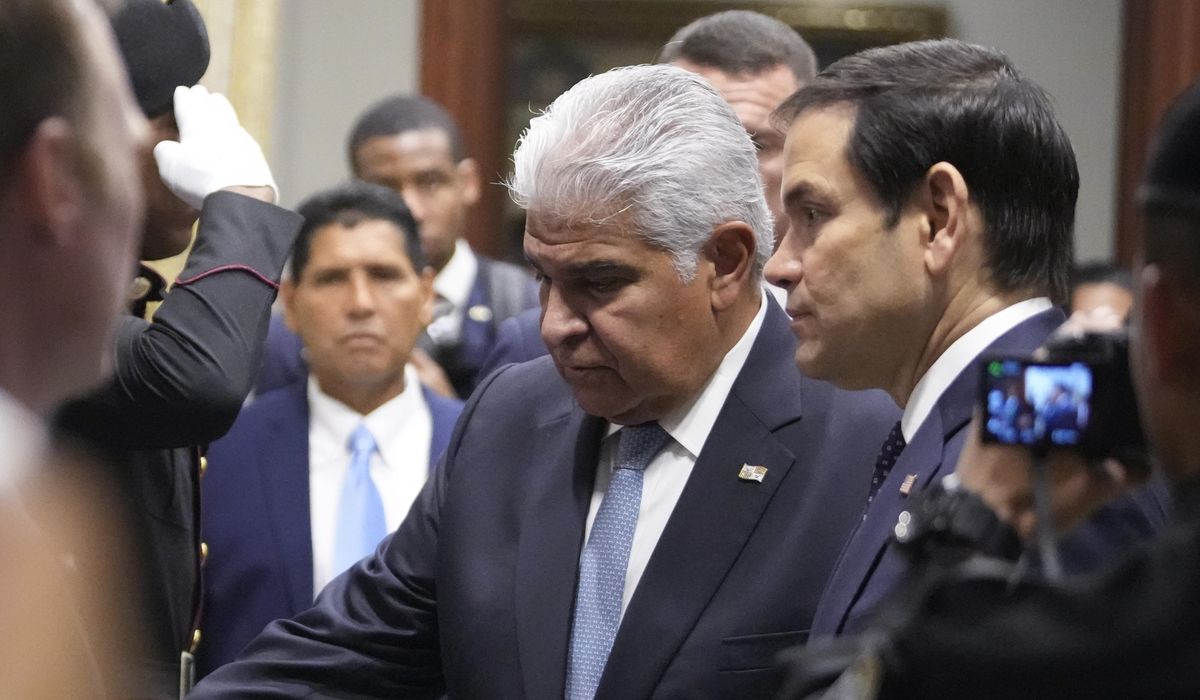


When Panama signed up for China’s vast Belt and Road Initiative in 2017, it became the first country in Latin America to join the massive international infrastructure financing project that Beijing has used to win friends and expand its global influence.
Five years later, Panama will be the first country in the Western Hemisphere to withdraw from the Belt and Road program, the first fruit of President Trump’s pressure campaign in the region.
Although it was overlooked amid talks on illegal immigration and the future of the Panama Canal, Secretary of State Marco Rubio was quick to claim victory after visiting Panama over the weekend on the Belt and Road issue. Previous U.S. administrations have looked at the program uneasily as a means for the ruling Chinese Communist Party to win global clout and ensnare participating countries in damaging debt.
President Jose Raul Molina’s announcement Sunday that Panama will let its participation in China’s Belt and Road Initiative expire “is a great step forward for U.S.-Panama relations, a free Panama Canal, and another example of [President Trump’s] leadership to protect our national security and deliver prosperity for the American people,” Mr. Rubio wrote on social media after leaving Panama for a stop in El Salvador.
One measure of the U.S. breakthrough was the quick and angry reaction from Beijing, which kept a relatively low profile as Mr. Trump began a whirlwind to his presidency on the domestic and foreign policy fronts.
Panama’s decision was “regrettable,” Fu Cong, the Chinese ambassador to the United Nations, told reporters in New York. “The smear campaign that is launched by the U.S. and some of the other Western countries on the Belt and Road Initiative is totally groundless.”
After meeting with Mr. Rubio, Mr. Molina agreed not to renew the memorandum of understanding that his predecessor signed with China on the former senator’s first foreign trip as America’s top diplomat.
“He’s a friend of America, [and] Panama is a strong partner and ally of the United States,” Mr. Rubio said Monday. He called his discussions with Mr. Molina “frank and respectful.”
Although Mr. Trump has focused much of his public criticism of Panama on its operation of the canal and what he says is growing Chinese influence over the operation of the America-built waterway, a top Republican in Congress said the Belt and Road decision could prove just as consequential.
Rep. Michael McCaul, a Texas Republican and former chairman of the House Foreign Affairs Committee, said China’s encroachment into the Western Hemisphere — including contracts by a Hong Kong company to operate critical ports at both ends of the Panama Canal — amounted to a “clear and present danger” to U.S. interests in Latin America.
“The Biden administration was asleep at the wheel, focusing on promoting woke policies abroad while China consolidated power in our own backyard,” he said. “I’m thrilled to see Secretary Rubio and the Trump administration already course-correcting, charting a new path for the U.S. and our neighbors in Latin America.”
He said Panama’s decision to cancel its Belt and Road contract with China was “a tremendous victory — not only for the United States but also for the Panamanian people who are escaping [China’s] debt trap diplomacy.”
Critics accuse Beijing of using the Belt and Road Initiative to lure developing countries into signing up for unsustainable loans for infrastructure projects. When the nation faces financial challenges or the project does not generate the expected return, China can seize the assets or demand crippling payments in return.
The Belt and Road Initiative, a pet project of Chinese President Xi Jinping, has been billed as extending China’s soft power and using its huge currency surpluses to advance its foreign policy goals. In the 10 years since the project began, some 150 countries have signed memorandums of understanding with China to explore participating in the Belt and Road Initiative, according to a study by the Wilson Center think tank last year.
Countries throughout Africa, Asia and Latin America soon began hosting Belt and Road Initiative projects, which quickly expanded beyond roads and bridges to include the financing of ports and harbors, high-speed data networks and satellite television service.
The rapid expansion has generated questions, as many Belt and Road infrastructure projects did not meet their billing.
“The terms and conditions of BRI financing were often shielded from public view through strict nondisclosure agreements, which in turn set off alarm bells with institutions like the World Bank and the International Monetary Fund,” the Wilson Center said in its study.
BRI-linked defaults in countries such as Sri Lanka and Zambia led to political instability and violence because of the steep inflation, spiraling rates of poverty and heavy taxes imposed to pay off foreign creditors, typically in China.
Italy signed a Belt and Road Initiative agreement with China in 2019, the only one of the Group of Seven leading industrialized nations to participate in a project primarily focused on developing countries. Rome declined to renew its memorandum of understanding in 2023.
Still, the U.S. will be pressed to match China’s growing investment and trade portfolio with countries across Latin America. Many of these will look to Beijing if Mr. Trump makes accessing U.S. markets more difficult.
“China’s state firms are major investors in the region’s energy, infrastructure and space industries, and the country has surpassed the United States as South America’s largest trading partner,” Diana Roy, a senior writer at the Council on Foreign Relations, wrote in a recent survey of China’s growing influence in Central and South America.
She noted that China is South America’s top trading partner and the second largest in Latin America, behind only the U.S.
“Beijing has also expanded its cultural, diplomatic and military presence throughout the region,” she said. “Most recently, China celebrated the opening of a megaport in Peru,” which Mr. Xi attended.
• Mike Glenn can be reached at mglenn@washingtontimes.com.
